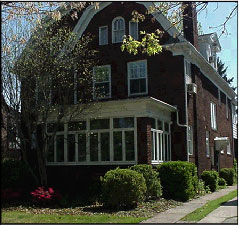Mark Twain showed river towns have more than their share of vices. RIVER VICES shows Portsmouth, located at the confluence of the Ohio and Scioto Rivers, is no exception.
 |
| Mike Mearan: the Most Notorious Appointee |
The Portsmouth Daily Times
reported (18 May 2013) that a second candidate, Lance L. Richardson, is going to throw his hat in the ring for the Third
Ward council seat being vacated by Nick Basham. Does that mean he wants to be appointed by the council or that he wants to be a write-in candidate in the regular election? As far as I know, Richardson has previously shown no interest in becoming a member of city government the old-fashioned way, by running for office. That is often the case with appointees. They run for office the way Rosie Ruiz ran the 1980 Boston Marathon, by skipping the grueling race but showing up at the finish line. The “ring” Richardson threw his hat into consists
not of Portsmouth voters but the remaining five Portsmouth city council members whom the city
charter authorizes to appoint replacements to the city council. Back on 26 June 2006, Richard
Noel, president of the Concerned Citizens Group, wrote a letter to the Portsmouth City Council requesting that a measure be placed on the ballot calling for the term for
city council members be reduced from four to two years. Up until 1985, Portsmouth City Council
members served two-year terms, but then that provision
was changed in that year by charter amendment. The council rejected Noel's proposal and declined to allow the voters decide whether to go back to two-year terms.
City Council = House of Representatives
The Founding Fathers intended that the U.S. House of Representatives be “the
people’s house,” the body of the federal government that would be directly
elected by, and therefore most accountable to, the people. It was to be the
most representative and the most held-accountable body of the federal government. In
the Federalist Papers, Hamilton and Madison wrote, “As it is essential to
liberty that the government in general should have a common interest with the
people, so it is particularly essential that the branch of it under
consideration [the House of Representatives] should have an immediate
dependence on, and an intimate sympathy with, the people.” The best way they
could think of to insure that the House of Representatives would remain “the
people’s house,” was frequent elections. “Frequent
elections are unquestionably the only policy by which this dependence and
sympathy can be effectually secured” [emphasis added], they wrote in number
52 of the Federalist Papers. In regard to frequent elections, they quoted, in number
53, the proverb “that where annual elections end, tyranny begins.” But that
proverb was an old one, and conditions had changed since ancient Greece. Elections every year were
impractical when many voters were spread over large areas. Somewhat
reluctantly, because they preferred annual elections, the Founding Fathers
decided that the maximum term for a representative should be biennial, that is,
two years.
Local Government in Ohio
When Ohio designed its state government, it closely followed the federal model,
with a General Assembly that consisted of a House of Representatives and a
Senate. Following the federal model, terms for the Ohio House, the “people’s
house,” were two years. Most local governments in Ohio usually followed the
state model. In local governments, the legislative body, the counterpart to a
House of Representatives, is the city council. Following the example of the House
of Representatives, two-year terms were the general rule for city councils. But
a number of cities and towns have shifted to a mixture of two-year terms for ward
representatives and four-year terms for at-large council members; other
communities have shifted to a four-year term for all council members. The
Columbus City Council has four-year terms, but the city councils of Cleveland
and Cincinnati retain two-year terms. While there are exceptions, generally
smaller communities are more likely to have four-year terms for city council,
the larger ones two-year terms. Why the difference?
Possibly because larger urban areas with a history of municipal corruption
and machine politics see two-year terms as a way of removing those council members who turn out to be bad apples
before they spoil all the apples in the barrel. Cities and towns that have been plagued by
corruption and that distrust politicians as a class want city councils to be on
the short leash that two-year terms represent. A political machine or, in the case of Portsmouth, a clique, would more likely arise and persist in a city where members of city council had
four rather than two years in which to scheme, collude, and corrupt. Communities that don’t have a
history of crooked politics don’t want to go through the trouble and expense of having
elections every two years. But large cities like Cleveland and Cincinnati may
have learned that biennial elections are worth the trouble because they make
the city council more accountable. They learned from experience, as we have bitterly in Portsmouth, that at least some politicians are not to be trusted. The same thing that makes
four-year terms seem sensible in some communities makes them seem unwise in
others. The Concerned Citizens believed four-year city council terms is asking for trouble, which is what Portsmouth
got when it changed to four-year terms in 1985.
Checks and Balances
 |
The late Howard Baughman entering Marting Building
during an open-house for the public |
The three branches of government that the Founding Fathers established—the
legislative, the executive, and the judicial—were intended to serve as checks and balances on each other.
The counterparts of those three branches of government are discernible in local
government in the mayor or city manager (executive), the city council
(legislative), and the city solicitor and city courts (judiciary).
Unfortunately, too often at the local level, the three branches of government,
rather than checking and balancing each other, are in cahoots, forming a
tyranny that, with the connivance of the local media, represses and exploits the public they are supposed to be serving.
If you want to see a cornpone version of the kind of tyranny our Founding Fathers were
concerned about, Portsmouth provides a textbook example. The Portsmouth city council, the mayor, the city solicitor, the auditor,
with the collusion of long-time city clerk Jo Ann Aeh, would regularly meet illegally in her office just before council meetings like a gang
of safe-crackers planning a job. It was at one of these illegal backroom meetings that Marty Mohr orchestrated the appointment of Jerrold Albrecht to the city council as Austin Leedom reported online in The Sentinel, dated 6 May 2007 (click here). (For other Mohr antics, clear here.) While attending one of these closed-door illegal meetings, then councilman Marty Mohr was photographed through the city clerk's open door Joe Ferguson. The mugging Mohr responded defiantly by clenching his teeth for the camera.
 |
| Marty Mohr mugging for camera |
Just as Mayor Bauer predicted chaos would reign if he was recalled from office,
and just as council president Carol Caudill said, “God help the city of Portsmouth”
after she was recalled, the president of the city council in 2006, Howard
Baughman, who was facing a recall, warned of the consequences if the city council returned to two-year terms. Baughman
remarked at the 25 June 2006 city
council meeting, “There’s a learning curve when you become a city councilman.” He did not think council
members could possibly come to understand budgets in only two years. The real
reason Baughman and others opposed two-year terms was not learning curves. Two-year
terms were unacceptable because they might have helped loosen the grip of the clique of lawyers and
developers who controlled the city
through their puppets on the city council.
The only other defense beside
“learning curves” Baughman offered against two-year terms was that, “It would
just be constant turmoil and turnover every two years.” Though all council
members would run for election at the same time, it is unlikely that they would
all be defeated. And if they were, that might be the best thing for the city. If
biennial elections bring constant turmoil, how have the U.S. House of
Representatives, the Ohio House of Representatives, and the city councils of
many cities in Ohio managed to survive for as long as they have with two-year
terms? Where is the turmoil in the following two-year term Ohio cities: Alliance,
Amherst, Athens, Blue Ash, Chillicothe, Cincinnati, Cleveland, Cuyahoga Falls,
Lorrain, North Royalton, Norwood, Parma, Silverton, Warren, Wilmington,
Wyoming, etc? There has been a lot of turmoil in the Portsmouth City Council since
1985 and much of it has been the result,
directly and indirectly, of four-year terms and the recalls that would not
likely have taken place if council members had faced the electorate every two
years.
Honest
capable people in public office have no reason to object to two-year terms,
because they can be assured of reelection if they do a good job. It’s the
dishonest council members, and especially those who began their careers by
being appointed rather than elected, who want the four-year terms to continue.
Four-year terms for city council members helped perpetuate the political
clique that controlled Portsmouth on behalf of the now discredited Southern Ohio
Growth Partnership (SOGP). I don’t know whether Lance Richardson would turn out to be a good or bad councilman,
but why did he throw his hat in the
ring only now, as a potential appointee, rather than run in a regular election, as I
would think anyone not trying to cut corners and short-change democracy would prefer to do? Let us hope Richardson, a self-proclaimed tax expert, is not another of those shipwrecked characters who save themselves from drowning in a sea of insignificance by clambering aboard the raft of city government that is already crowded with other failures, dreaming no doubt that the game of musical chairs might result someday in their becoming mayor, as Malone did when he won the booby prize as a result of Mayor Murray’s recall.
When you
consider the council members who began their careers as appointees, the list is not encouraging. Baughman
was originally an appointee, when his friend and his next-door neighbor John Thatcher, conveniently resigned as Fifth Ward councilman. And then Baughman himself resigned before he could be recalled, making the appointment of John Haas possible in the endless appointee game of musical chairs that is orchestrated by Portsmouth’s powerful, unelected clique. Jerrold Albrecht first got on the council by appointment, and so did the notorious shyster Mike Mearan. James R. Saddler is the most recent appointment. Saddler had not shown any
interest in city government previously, except when he had to appear in court
for numerous speeding violations, including a DUI for which his license was suspended. For all those who prefer to begin their political
careers by applying to the council for a vacated position rather than run in an
election, we should have buttons that say not “I Voted,” but rather “I Applied.” But in any campaign to reduce the terms on city council to two years, Mearan should be the poster boy and he should be proudly wearing an “I Applied” button.

Current First Ward councilman Kevin W. Johnson tried to begin his political
career in Portsmouth when he applied to council to replace Tim Loper after Loper was forced to resign his seat when it was proved he was not living in the First Ward, the ward he represented, in violation of the city charter. To replace Loper, the city council appointed Mearan, arguably the most scandalous appointee in the history of the city, rather than Kevin W. Johnson.
I find the political jockeying to become council president that takes place among those council members, some of whom were originally appointees, unseemly. When Jane Murray was recalled, David Malone, as president of the council, replaced her in spite of the fact he had finished fourth behind her in the previous mayoral election. Malone had been elected to the presidency and next in line to be mayor, by appointees such as the lawyer John Haas, his fellow bankrupt, who is yet another council member who was appointed after failing to succeed in his chosen field. It is almost as if there is an unwritten requirement that candidates must be failures, if not bankrupts, before they will be considered as appointees. Who with any self respect would want to owe their presence on the council to an appointment by such a council? To revise the famous quote by Groucho Marx, “I don't want to belong to any city council that would accept me as a member.”

































